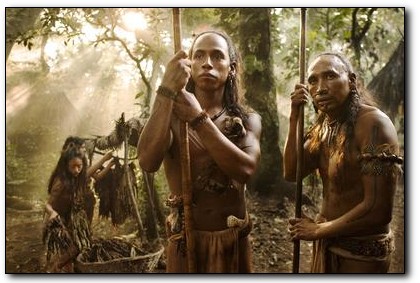A Native child who is being tutored or re-taught their language still has to deal with a world that does not consider Indians as people. Will a film like this make him proud to be Indian, horrified to be Indian, embarrassed to be Indian? How much more work will Native artists need to do to ameliorate the reinforced dehumanizing affect in the mainstream that this film likely will have? The most destructive force in Indian communities today is that internalized self-hatred. We all have experienced it. "Are you Indian enough?" Maybe your skin is too dark, or maybe it's too light, or maybe you’re too smart. This is just one example of it. And then there’s Sherman Alexie’s resonating saying that you can only be an Indian if you ever wished you weren’t an Indian.


3 comments:
Some info about Alexie from The Harm of Native Stereotyping: Facts and Evidence:
On the reservation, he and others would play cowboys and Indians because they were American, too, he says. Watching Westerns, he would root for John Wayne, he adds.
"I distinctly remember doing that because I didn't recognize those Indians; I wasn't those Indians; I wasn't running around in a loincloth. I wasn't vicious. I wasn't some sociopath with war paint." Alexie says.
--Interview with Sherman Alexie, CBSNews.com, 3/20/01
Like "data," "media" is transitioning from a plural noun to a singular collective noun. I use it this way and don't find it objectionable.
http://dictionary.reference.com/browse/media
Usage note: Media, like data, is the plural form of a word borrowed directly from Latin. The singular, medium, early developed the meaning “an intervening agency, means, or instrument” and was first applied to newspapers two centuries ago. In the 1920s media began to appear as a singular collective noun, sometimes with the plural medias. This singular use is now common in the fields of mass communication and advertising, but it is not frequently found outside them: The media is (or are) not antibusiness.
I'm not sure if stereotypes evolve, but our collective understanding of them does. For instance, about 99.9% of the population used to think Indians were savages. Now maybe only half or 2/3 of the population think that.
Languages evolve. Correct is what the majority of speakers says is correct. For instance, "gay" now means "homosexual" more than it means "cheerful."
I quoted the current dictionary definition of "decimate": to destroy a great number or proportion of. E.g., "The tsunami decimated 3/4 of the buildings along the beach." This definition isn't even in question any more; it's the standard one.
I also quoted a current usage note on "media." Here's another one:
http://grammar.ccc.commnet.edu/grammar/plurals.htm
Many careful writers insist that the words data and media are Latin plurals and must, therefore, be used as plural words. The singular Latin forms of these words, however, are seldom used: datum as a single bit of information or medium as a single means of communication. Many authorities nowadays approve sentences like
My data is lost.
and
The media is out to get the President.
Even textbooks in computer science are beginning to use "data" as a singular.
Post a Comment